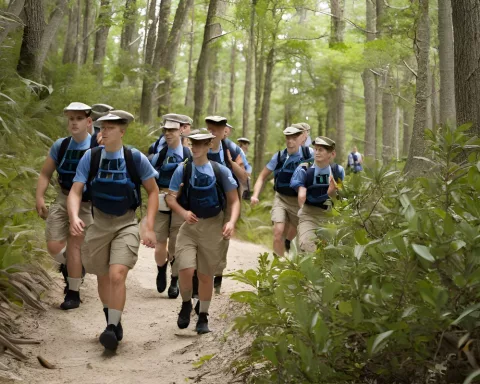Deputy Minister of Tourism, Fish Mahlalela, gave a powerful speech at the Sharing of Best Practices Workshop, emphasizing the vital role of youth in the tourism industry and the global economy. He called for creative strategies to empower and celebrate young individuals, especially those in developing nations. Mahlalela highlighted the impact of the recent health crisis on the tourism sector and urged for collective efforts towards recovery, including supporting small businesses and providing opportunities for youth in tourism and hospitality. He expressed optimism for a more inclusive, innovative, and interconnected future for the industry.
Understanding the Role of Youth in Tourism: Insights from Deputy Minister, Fish Mahlalela. The Deputy Minister emphasized the need for creative strategies that not only empower youth but also celebrate them in the tourism sector. He also highlighted the National Tourism Career Expo (NTCE), which focuses on equipping jobless youth with skills for opportunities in tourism and hospitality.
A Global Gathering for Tourism
The powerful and enlightening speech given by Deputy Minister of Tourism, Fish Mahlalela, during the Sharing of Best Practices Workshop sheds light on the vital contribution of youth in the tourism sector and broader global community. Overflowing with positivity, this riveting presentation delves into the multi-dimensional influence of the tourism industry on the worldwide economy and the difficulties posed in the aftermath of the recent health crisis.
In his opening remarks, Deputy Minister Mahlalela acknowledged the distinguished audience, which included representatives from several nations and an array of tourism organizations. He displayed his delight at the worldwide unity shown in tackling the problems posed by the health crisis. This global congregation exemplifies the potency of international collaboration and the mutual commitment to reviving the tourism industry on a global scale.
The Youth Factor and Tourism
Mahlalela brought attention to the startling statistic that of the 1.3 billion young individuals across the globe, 85% live in developing nations, with nearly half of them residing in areas plagued by conflict, making it challenging for them to secure employment. He emphasized the need for creative strategies that not only empower these young individuals, but also celebrate them.
The Deputy Minister also spoke about the dismal prediction by the UNWTO, which forecasted a slump in international tourist arrivals by 20% to 30% in 2020 when compared with 2019 figures — a severe setback, especially for countries heavily dependent on tourism. Prior to the pandemic, the tourism sector had been flourishing, contributing 10.3% to the global GDP and creating one out of every ten jobs worldwide. The sector’s growth in 2019 surpassed that of the global economy for the ninth year in a row, thereby benefiting local communities at a quicker rate than many other sectors.
The Impact and Recovery of Tourism
Mahlalela emphasized that the tourism sector plays a vital role in alleviating poverty and enhancing overall well-being through its generation of revenue and jobs. Its distinctive capacity to safeguard vulnerable groups and communities, stimulate innovation, and conserve local heritage and culture is commendable. However, the disastrous consequences of the pandemic have resulted in the loss of hundreds of millions of jobs and sources of income, necessitating more immediate and collective efforts for recovery.
The Minister also accentuated the function of tourism as a driving force for innovation and entrepreneurship, providing support to local businesses and inspiring new initiatives. Small and Medium-Sized Enterprises (SMEs), constituting 80% of the Travel & Tourism sector, bore the brunt of the pandemic. He called upon tourism scholars to contribute research-oriented, data-backed ideas and solutions for the future of the sector.
Empowering Youth Through Tourism
In the context of empowering youth, the Deputy Minister mentioned various programs launched by the Department, focused on equipping jobless youth with skills for opportunities in tourism and hospitality. He referred to the National Tourism Sector Strategy (NTSS) 2016-2026‘s aim to ensure a skilled and professional tourism workforce that can deliver a world-class visitor experience.
Mahlalela also highlighted the National Tourism Career Expo (NTCE), which targets high school students, college and university students, out-of-school youth, and unemployed graduates. He hailed the Program for changing the perception that the tourism industry only offers menial and low-paying jobs.
In terms of air connectivity, the Deputy Minister spoke about how countries liberalizing their aviation sector would generate entrepreneurship opportunities and value chain jobs, primarily benefiting the youth. He also discussed the relaxation of Visa restrictions and the introduction of e-Visas as opportunities that youth should capitalize on as the sector progresses.
In his closing remarks, Mahlalela expressed optimism for engaging discussions and sharing information and best practices that would contribute to the recovery of tourism in all nations. He underscored the necessity for a new normal — one that is more inclusive, innovative, and interconnected.
Through his enlightening speech, Deputy Minister, Fish Mahlalela, thus highlights the potential of the tourism sector as a potent tool for empowering youth and the urgent need for collective efforts towards its revival.
1. What was the focus of Deputy Minister Fish Mahlalela’s speech at the Sharing of Best Practices Workshop?
Deputy Minister Fish Mahlalela’s speech at the Sharing of Best Practices Workshop emphasized the vital role of youth in the tourism industry and the global economy.
2. What are some of the challenges faced by young individuals in developing nations when it comes to securing employment in the tourism industry?
Of the 1.3 billion young individuals across the globe, 85% live in developing nations, with nearly half of them residing in areas plagued by conflict, making it challenging for them to secure employment.
3. What was the prediction made by the UNWTO for international tourist arrivals in 2020?
The UNWTO predicted a slump in international tourist arrivals by 20% to 30% in 2020 when compared with 2019 figures due to the pandemic.
4. What are some of the ways in which the tourism sector can contribute to the empowerment of youth?
The tourism sector can contribute to the empowerment of youth through programs launched by the Department that focus on equipping jobless youth with skills for opportunities in tourism and hospitality. This includes initiatives such as the National Tourism Sector Strategy (NTSS) 2016-2026 and the National Tourism Career Expo (NTCE), which targets high school students, college and university students, out-of-school youth, and unemployed graduates.
5. What was Deputy Minister Fish Mahlalela’s vision for the future of the tourism industry?
Deputy Minister Fish Mahlalela expressed optimism for a more inclusive, innovative, and interconnected future for the tourism industry.
6. What was the impact of the recent health crisis on the tourism sector, and what are some of the steps that can be taken towards recovery?
The recent health crisis resulted in the loss of hundreds of millions of jobs and sources of income in the tourism sector. To recover, there is a need for collective efforts towards recovery, including supporting small businesses and providing opportunities for youth in tourism and hospitality. The Minister also emphasized the function of tourism as a driving force for innovation and entrepreneurship, providing support to local businesses and inspiring new initiatives.












